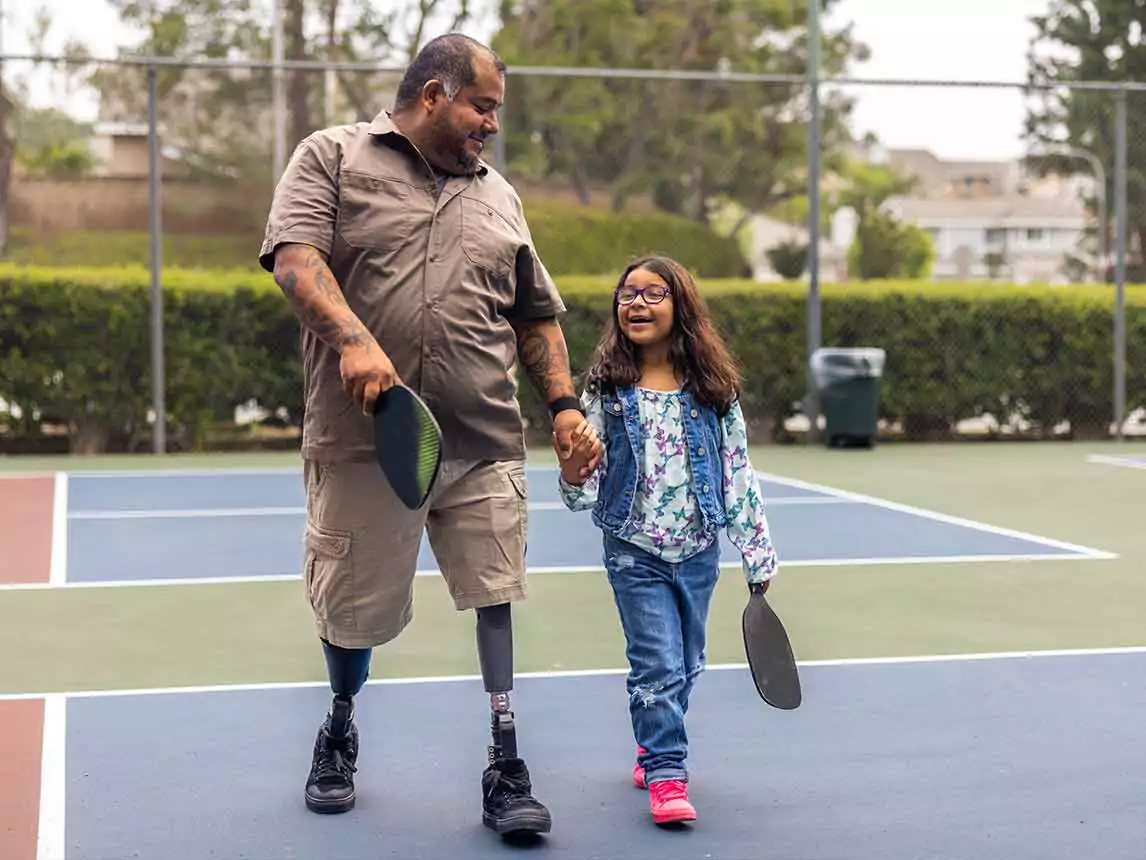Just as Veterans are eligible for VA benefits after they have completed their service, their spouses and dependents may also be able to receive coverage. While there are several different benefit programs, CHAMPVA is specifically designed for those dependents of a qualifying Veteran sponsor that are not eligible for these other benefit programs.
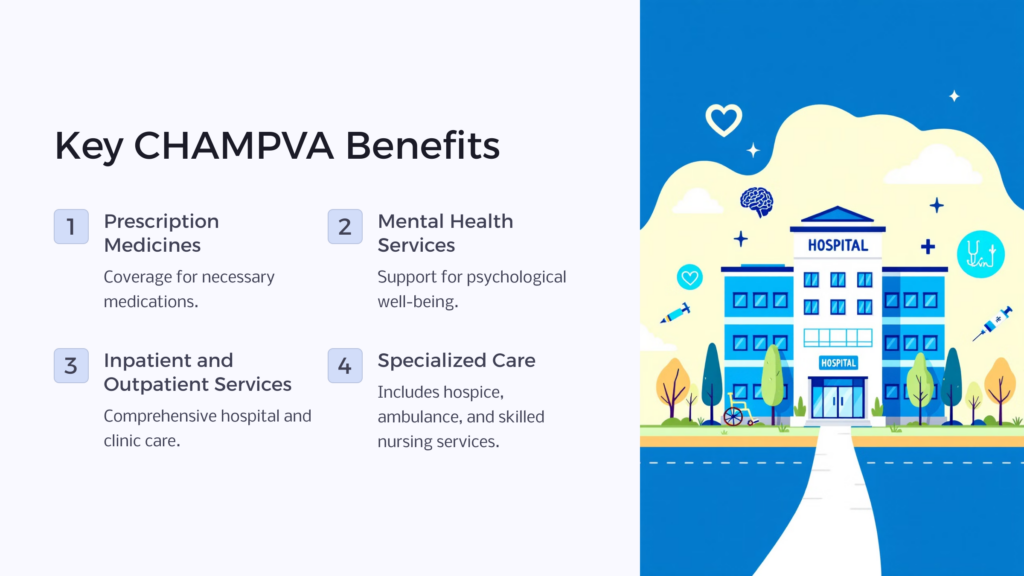
11 CHAMPVA Benefits for Families of Veterans
- Prescription Medicines
- Mental Health Services
- Ambulance Services
- Hospice Services
- Durable Medical Equipment (DME)
- Maternity Services
- Organ Transplants
- Inpatient Services
- Outpatient Services
- Ambulatory Surgery
- Skilled Nursing Care
In order to receive these CHAMPVA benefits, beneficiaries need to ensure they are working with a health care provider that accepts and works with CHAMPVA for services to be covered. Otherwise, individuals will need to submit a claim to be reimbursed.
However, reimbursement will only be at the level of the “allowable amount.” Additionally, some specific services and supplies require pre-approval, including mental health and substance abuse services, durable medical equipment costing $2,000 or more, adjunctive dental procedures, and organ and bone marrow transplants.
It is also important to keep all information up-to-date regarding changes in marital status, other health insurance, etc. to avoid a lapse in coverage, if eligible.
What Is CHAMPVA?
The Civilian Health and Medical Program of the Department of Veterans Affairs (CHAMPVA) is one of the benefit programs available to the eligible spouse, surviving spouse, and dependents of an eligible disabled veteran or deceased veteran. Through this program, the VA shares the cost of specified health care services and supplies. To receive CHAMPVA benefits, you cannot be eligible for other VA health benefits like TRICARE.
Using cost-sharing, CHAMPVA covers most medically necessary services and supplies, including doctor’s office visits, prescriptions, mental health care, lab and radiology services, and hospital services. However, CHAMPVA benefit recipients must use an authorized health care provider for services and supplies to be covered. Confirm with your provider that they accept CHAMPVA. If you need to find a new provider, try Medicare or TRICARE providers.
Beneficiaries of CHAMPVA benefits are responsible for an annual deductible ($50 per beneficiary or a maximum of $100 per family) as well as 25% of CHAMPVA’s “allowable amount,” up to $3,000 per calendar year.
The allowable amount is the most that CHAMPVA will pay for covered services or supplies. While there is a deductible, services provided by a VA medical center such as inpatient services, ambulatory surgery facility services, and hospice services, do not have a deductible.
CHAMPVA can be used as minimum essential coverage under the Affordable Care Act. Likewise, CHAMPVA benefits can be used in conjunction with other health insurance coverage, with the other health insurance being billed first – unless your other health insurance is Medicaid, Indian Health Services, State Victims of Crime Compensation Program, or CHAMPVA supplement health insurance. Using other health insurance can be beneficial in covering the gaps in CHAMPVA coverage such as dental and eye care coverage.
Note that while CHAMPVA is often confused with TRICARE coverage (a program formally called CHAMPUS), they are two different programs each with its own set of eligibility criteria.
Who Is Eligible for CHAMPVA?
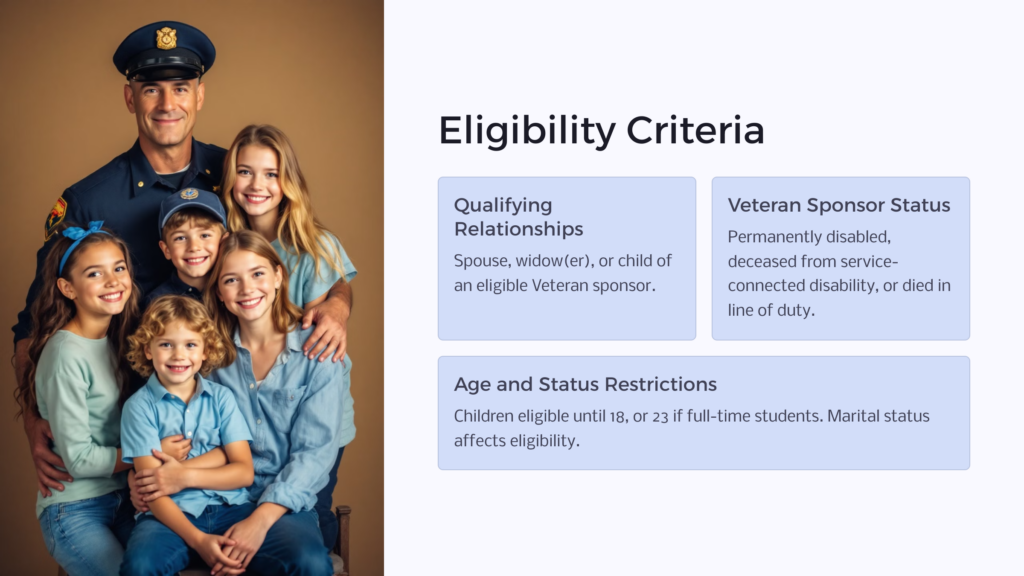
To be eligible for CHAMPVA benefits you must be the spouse, widow(er), or child of a qualifying Veteran sponsor. A qualifying Veteran sponsor is a Veteran who has been rated permanently or totally disabled by the VA or has passed from a service-connected disability.
A qualifying veteran may have also died in the line of duty. If a Primary Family Caregiver is eligible for TRICARE, they would not be eligible for CHAMPVA benefits. However, a qualified Veteran sponsor may still be eligible for their own veterans benefits.
Only those who are a current spouse, surviving spouse, or child of the qualifying Veteran sponsor are eligible for benefits. A spouse will lose CHAMPVA eligibility if there is a divorce or annulment from the qualifying Veteran sponsor. In the case of a divorce, the children of the Veteran would continue to be eligible for CHAMPVA benefits. However, for new children to have CHAMPVA benefits, you will need to get the new child a Social Security number and establish dependency of the newborn to the Veteran sponsor.
Children of the Veteran will lose benefits when they turn 18 unless they are enrolled full-time at an accredited school. Otherwise, the child will lose benefits when they cease to be a full-time student, turn 23, or get married. Stepchildren of the qualifying Veteran sponsor will lose CHAMPVA benefits in the case of divorce or when they no longer live in the household of the sponsor.
If you are a widow or widower, you will retain your CHAMPVA benefits until you remarry (prior to the age of 55). You will retain your CHAMPVA benefits if you remarry after age 55. Likewise, if you lose your CHAMPVA benefits due to remarriage, and your remarriage ends due to divorce, annulment, or death, your CHAMPVA benefit eligibility may be reestablished.
Eligibility for CHAMPVA benefits is also affected by Medicare eligibility. To stay eligible for CHAMPVA benefits, you must enroll in, and stay enrolled in, Medicare Part B. You can do this separately or as part of a Medicare Advantage plan. The only exception is if you were 65 or older before June 5, 2001, eligible for CHAMPVA benefits, and have Medicare Part A.
Once you sign up for Original Medicare (Part A and Part B), you will need to make sure you also submit a CHAMPVA Other Health Insurance (OHI) Certification Form to ensure there is no interruption in your CHAMPVA benefits.
CHAMPVA requires you to submit documentation for each CHAMPVA beneficiary to verify eligibility.
How To Apply for CHAMPVA
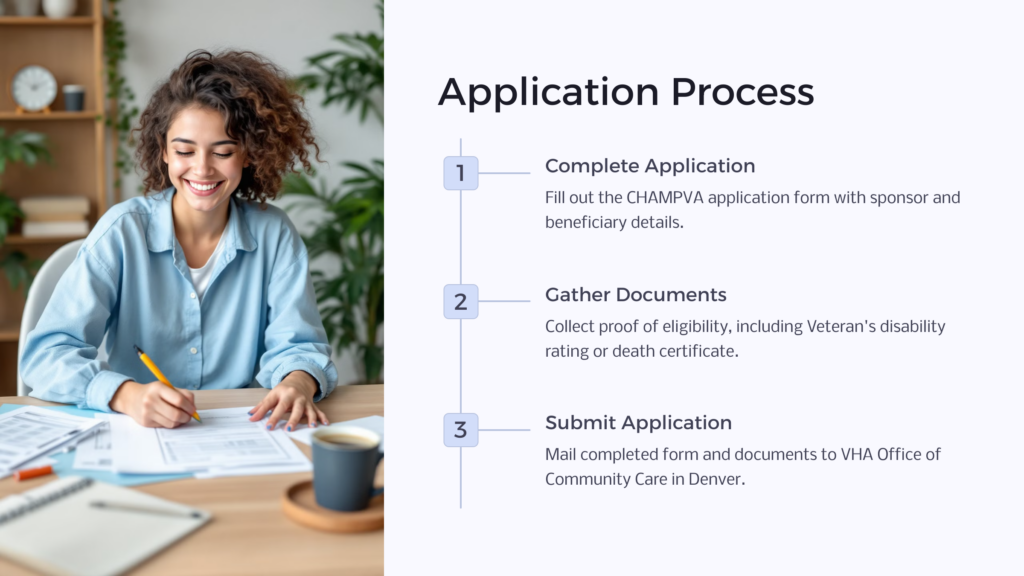
Applying for CHAMPVA benefits is a relatively straightforward process. To apply you will need to complete the application, submit the required documents proving eligibility, and mail the application to the VHA Office of Community Care, based in Denver, Colorado.
The application for CHAMPVA benefits requires basic identifying information of the qualified veteran sponsor as well as the eligible beneficiary that is applying. Additionally, information will need to be provided as to whether the beneficiary is enrolled in Medicare or has other health insurance.
If there is Medicare or other health insurance, an additional form will need to be filed to ensure you receive your CHAMPVA benefits. If you are eligible for Medicare you will need to also submit a copy of your Medicare card. Those over age 65 who are not entitled to Medicare must send the appropriate documentation from the Social Security Administration confirming that you are not entitled to any Medicare benefits.
Once the application is received, it can take 2-8 months to get your CHAMPVA identification card and related materials, assuming you only provide the minimum requested documents that the VHA Office of Community Care must verify and confirm with federal agencies. The process can be accelerated by providing additional documentation to prove your eligibility.
Additional documents may include the VBA rating decision letter showing the Veteran sponsor is permanently and totally disabled, the Veteran sponsor’s DD214 Certificate of Release or Discharge from Active Duty, birth certificate/adoption papers for children, or school certification of full-time enrollment for children between the ages of 18 and 23. If you are a widow(er) that was remarried and again find yourself single, you may also provide the legal documentation terminating the remarriage (i.e. annulment decree, divorce decree, or death certificate).
To prevent delays in your application processing, confirm that the application is both signed and dated prior to mailing in the application. If the application for CHAMPVA benefits is for a spouse, make sure you include the date of marriage on the application. If the application is found to be incomplete, it will be returned with further instructions. However, this will delay your ability to use the CHAMPVA benefits.
How To File a CHAMPVA Claim
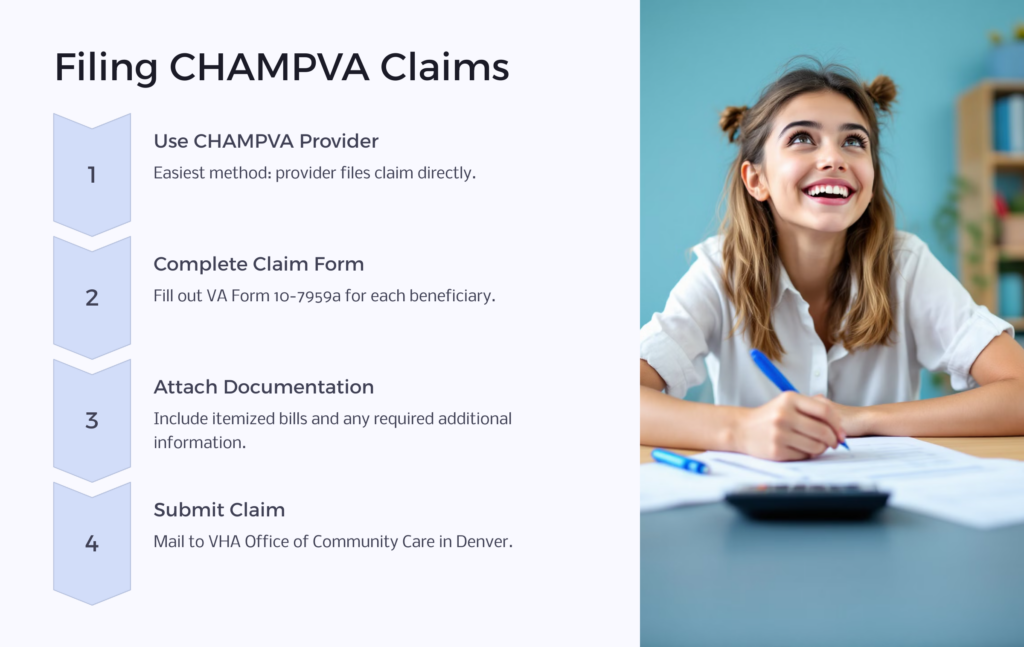

Contacting a healthcare provider that works with CHAMPVA benefits is the easiest way to file a claim since the provider will file it directly. Because providers are used to filing CHAMPVA claims, they are more likely to submit all of the necessary information to process the claim without a denial.
To file a CHAMPVA claim, you need to submit a CHAMPVA Claim Form (VA Form 10–7959a). On this form, you will need to list your name exactly as it is on your champion identification card.
You will need a separate claim form for each beneficiary, even if it is for beneficiaries in the same family. Claims will be denied if the claim forms are not signed and dated. It is also essential that you provide an itemized bill from your provider that lists out the itemized charges for each service, the specific date of each service provided, appropriate diagnosis and procedure codes for each service, and the professional status of the healthcare provider.
The itemized bill should also include your Social Security number, the tax ID of the provider, and address where the services were provided, and an address for the payment to be sent. If CHAMPVA benefits are being used as secondary insurance, you will also need to submit an explanation of benefits (EOB) from your primary insurance detailing what they paid.
The process is similar in filing a CHAMPVA claim for the pharmacy as well. Your form must list your name exactly as it appears on your identification card and a separate form must be filed for each beneficiary. All submitted claims must be signed and dated. In addition to the claim form, you will also need to submit an itemized bill from your pharmacy that includes the pharmacy details, the name of the prescribing physician, all information related to each drug (including the 11-digit National Drug Code), the charge for each drug, the copayment for each drug, and the date the prescription was filled.
Note that if Kaiser Permanente is your primary insurance, they do not provide the needed information to file a claim for reimbursement of CHAMPVA benefits. Kaiser Permanente bills do not include the medical diagnosis or procedure code. Therefore, when filing a claim with this primary insurance, CHAMPVA can use code V70 for the diagnosis and code 99499 for the procedure.
When filing a CHAMPVA claim with Kaiser Permanente, you will also need to submit a copy of the Kaiser Permanente card, the amount of your copayments with your claims, the address of the Kaiser provider, the date of service, the medical code or description of the diagnosis/procedure, and the patient’s copay.
To file a CHAMPVA claim as a beneficiary, you will need to complete VA Form 10-7959a and mail it to the VHA Office of Community Care located in Denver.
How to Appeal a Decision About Your CHAMPVA Benefits
If your CHAMPVA claim is denied, you have the right to request reconsideration from the National Health Administration. You can request reconsideration as a beneficiary, or your provider can request reconsideration on your behalf. You have one year from the time you are notified to file a written statement explaining that you disagree with the denial of the claim.
In addition to the written statement, you will also need to attach any pertinent documentation to support your claim as well as a copy of the notification of denial. Again, you will mail this written statement and documentation to the VHA Office of Community Care in Denver.
Note that for the request to be reconsidered, it must be received in writing within one year of the date of the notification.
Understanding CHAMPVA Health Care Benefits
As a Veteran, you are entitled to certain health care coverage, whether you are active duty, disabled, or retired. Likewise, your family (spouse, widow, or children) may also be eligible for benefits. CHAMPVA provides minimum essential coverage to those that are eligible through a qualified Veteran sponsor.
CHAMPVA provides coverage for doctor’s office visits, hospital services, lab and radiology services, prescriptions, and mental health care. However, it does not provide coverage for most dental care, hearing exams, eye care coverage, or any kind of experimental drug or procedure. These benefits can be used as a secondary payer, to cover additional costs that your primary insurance won’t cover.
If your spouse or parent served in the US military and was disabled in service or passed while serving, you may be eligible for CHAMPVA benefits. If you are eligible, apply for CHAMPVA benefits to ensure that you have the coverage you need and meet your minimum coverage requirement for the Affordable Care Act. Just be sure to apply for benefits before you actually need them.
 Benefits.com Advisors
Benefits.com Advisors
With expertise spanning local, state, and federal benefit programs, our team is dedicated to guiding individuals towards the perfect program tailored to their unique circumstances.
Rise to the top with Peak Benefits!
Join our Peak Benefits Newsletter for the latest news, resources, and offers on all things government benefits.

















